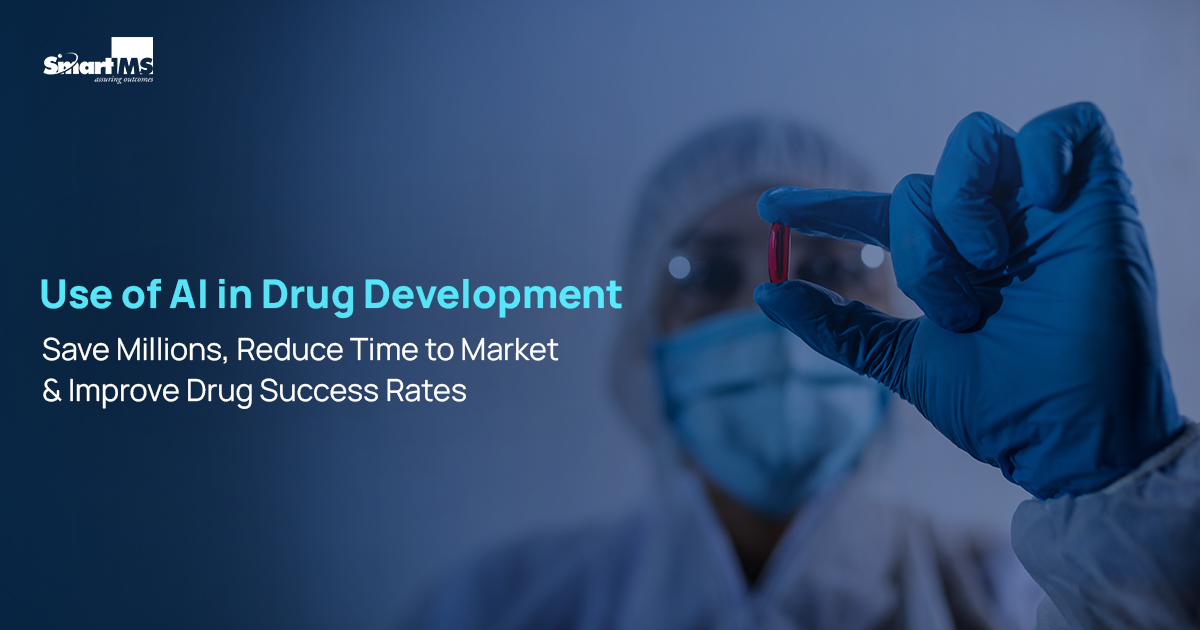Imagine a world where life-saving drugs are discovered in a fraction of the time it takes today. Where the risk of failure is minimized, and the costs associated with development drop significantly. It’s not a distant dream, but a reality being shaped by Artificial Intelligence (AI).
For years, the drug discovery process has been a slow, expensive, and often uncertain journey. But now, AI is transforming how drugs are developed, promising to revolutionize an industry that has traditionally relied on painstaking research and trial-and-error methods.
As pharmaceutical companies race to develop new treatments faster, AI is emerging as a key player—speeding up the discovery process, improving accuracy, and potentially saving billions.
In this blog, we’ll explore the role of AI in drug development and look at the seven most significant impacts this technology is having on the life sciences industry.
Let’s begin!
- Accelerating the Drug Discovery Process
Traditionally, discovering a new drug has been an excruciatingly slow process, often taking years to bring a single treatment to market. The sheer volume of data researchers must analyze—combined with the intricate biological systems of the human body—makes this task even more daunting. But AI is changing the game. By using machine learning to sift through vast amounts of data at lightning speed, AI can identify promising drug candidates far quicker than any human could. This means faster treatments for patients and a significant leap forward for the pharmaceutical industry.
- Slashing Development Costs
Drug development is notoriously expensive, with an average price tag of around $2.6 billion to bring a new drug to market. Much of this cost is absorbed during the early stages of development and clinical trials, often due to high failure rates and inefficient testing. AI is stepping in to reduce these costs. By applying predictive models, AI helps pharmaceutical companies identify the most promising drug candidates early, minimizing wasted resources. This approach could save the industry up to $100 billion annually, not only improving efficiency but also unlocking funds that can be reinvested in developing more effective treatments.
- Achieving Precision in Drug Design
Precision is key when designing drugs—after all, the goal is to target the disease without causing harm to the patient. Traditional methods often rely on a lot of trial and error, resulting in significant time and resource losses. AI brings an unmatched level of precision to the process. By analyzing molecular data and predicting how compounds will interact with the human body, AI helps design drugs that are more targeted, effective, and have fewer side effects. This precision could eventually lead to highly personalized medications that work for individual patients based on their unique biological makeup.
- Paving the Way for Personalized Medicine
Personalized medicine aims to tailor treatments to the specific genetic, environmental, and lifestyle factors of individual patients. This approach promises better outcomes but requires analyzing massive amounts of patient data—a task traditionally fraught with delays and complications. AI is breaking down these barriers. By analyzing genetic profiles and health records, AI can predict which drugs are most likely to work for a given patient, enabling the development of truly personalized treatment plans. This could be the end of the one-size-fits-all approach and the dawn of customized, more effective therapies.
- Preventing Adverse Reactions Before They Happen
One of the biggest challenges in drug development is predicting how a drug will affect the human body. Adverse reactions can be life-threatening and lead to costly recalls. Traditionally, identifying these issues occurs late in the process—too late for patients already taking the drug. AI, however, can predict these reactions by analyzing clinical and molecular data to identify potential safety risks early. This proactive approach allows researchers to modify formulations before clinical trials, reducing the likelihood of dangerous side effects and regulatory roadblocks.
- Revolutionizing Clinical Trials
Clinical trials are a critical part of the drug development process, but they’re also among the most time-consuming and expensive stages. Finding the right participants, ensuring the integrity of the data, and analyzing the results can take years. AI is improving clinical trial efficiency by identifying the most suitable participants based on their medical histories and genetic data. This allows researchers to optimize patient recruitment, speed up data collection, and detect issues in real time. As a result, clinical trials are becoming more reliable, faster, and cost-effective, bringing essential treatments to the market quicker.
- Facilitating Drug Repurposing
Drug repurposing—finding new uses for existing drugs—can significantly speed up the process of getting life-saving treatments to patients. However, the process of identifying new uses for existing drugs has traditionally been labor-intensive and slow. AI accelerates this process by analyzing large datasets and pinpointing potential new therapeutic applications for approved medications. During the COVID-19 pandemic, AI-driven drug repurposing efforts led to the identification of promising treatments in record time, highlighting the transformative potential of this approach.
Conclusion
AI is reshaping the drug discovery process, making it faster, more affordable, and incredibly precise. By automating data analysis and predicting outcomes, AI is helping pharmaceutical companies bring life-saving treatments to the market quicker and with greater confidence. At Smart IMS, we are passionate about driving this transformation.
With our expertise in AI and ML, we can help you streamline your drug discovery process, improve predictions, and ultimately bring innovative treatments to life, faster and more effectively. Our team will work closely with you to integrate advanced AI solutions that automate complex tasks, optimize data analysis, and predict drug efficacy with precision. By leveraging our cutting-edge technologies, we can accelerate the research phase, reduce costs, and enhance the accuracy of clinical trials.
Let us be your partner in shaping the future of medicine. Contact US



